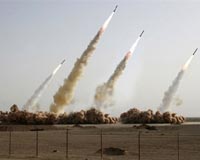| . |  |
. |
Tel Aviv, Israel (UPI) Sep 22, 2009 U.S. Navy warships have begun arriving in Israel for joint missile defense exercises next month, and the Jerusalem Post reports that officials believe some systems may remain in the Jewish state to strengthen its defense shield against feared Iranian missile attacks. Meantime, Israeli Defense Minister Ehud Barak, a former general who is the country's most decorated soldier, was scheduled to fly to Washington for discussions with U.S. Defense Secretary Robert Gates on the Iranian threat. The talks will include the role Israel will play in the revised U.S. missile defense plans announced by the administration of President Barack Obama earlier this month. This involves scrapping plans to deploy anti-ballistic interceptors and radars in Poland and the Czech Republic, and switching to naval-based defenses in the Mediterranean and the North Seas instead. There has been speculation that some systems may be based in Israel, where advanced U.S. X-band radar was deployed in the southern Negev desert in 2008. The Jerusalem Post said that one possibility was that U.S. Navy Aegis warships armed with SM3 Standard missile interceptors would be deployed in the Mediterranean and Red seas north and south of Israel. It is not clear whether there is any linkage between such moves and what appears to be growing pressure by Israel for military action against Iran to knock out its controversial nuclear program and strategic military targets, such as ballistic missile sites. A unilateral pre-emptive Israeli strike would almost certainly trigger an Iranian missile attack on the Jewish state, and the heavier Israel's defenses are the greater its chances of destroying incoming missile salvoes. The Obama administration is committed to seeking a diplomatic solution to the Iranian nuclear issue, but Tehran has declared it is not prepared to abandon its uranium enrichment program, the key element in producing nuclear weapons. Israel's military planners fear that the window of opportunity is closing for a possible strike against Iran before it can build up its air-defense system or, in the worst case, acquire nuclear arms. The Washington-based Center for Strategic and International Studies said in an Aug. 19 report that Iran's growing arsenal of ballistic missiles armed with conventional high-explosive warheads pose a danger to Israel's cities rather than its military centers. According to Jane's Missiles & Rockets, "The report sees few practical uses for the (missile) force other than to threaten cities. Deploying (non-nuclear) ballistic missiles against military targets would require a number likely to be beyond Iran's current inventory." However, Uzi Rubin, the former director of Israel's missile defense program, warned earlier in August that Iran's missile technology was more advanced than that of North Korea despite international sanctions that restrict the transfer of missile technology to the Islamic Republic. This was underlined by Iran's successful test in May of the Sajjil 2 ballistic missile, the first to use solid rather than liquid fuel, and capable of carrying a 450-pound warhead 1,540 miles. Even so, the Americans have said that one of the reasons they have revised the Bush-era Ballistic Missile Defense program, designed to protect the United States and Western Europe against Iranian missiles, was the belief that the more imminent threat from Iran was its medium-range missiles rather than its efforts to develop an intercontinental missile. By redeploying U.S. interceptors in the Middle East to counter the existing Iranian threat, the Obama administration is hoping that it will bolster its influence with Israel, and the Arab states that also feel threatened by Iran, and thereby head off a conflict that could engulf the entire Middle East.
Share This Article With Planet Earth
Related Links Learn about missile defense at SpaceWar.com Learn about nuclear weapons doctrine and defense at SpaceWar.com All about missiles at SpaceWar.com Learn about the Superpowers of the 21st Century at SpaceWar.com
 Israel, U.S. plan drill to combat missiles
Israel, U.S. plan drill to combat missilesTel Aviv, Israel (UPI) Sep 21, 2009 The Israeli and U.S. militaries are expected to launch joint exercises in October to counter the nightmare scenario of coordinated missile and rocket attacks against the Jewish state from Iran, Syria, Lebanon and the Gaza Strip. The maneuvers are part of the biannual Juniper Cobra exercises on missile defense conducted by the two allies since 2000. These are designed to integrate the ... read more |
|
| The content herein, unless otherwise known to be public domain, are Copyright 1995-2009 - SpaceDaily. AFP and UPI Wire Stories are copyright Agence France-Presse and United Press International. ESA Portal Reports are copyright European Space Agency. All NASA sourced material is public domain. Additional copyrights may apply in whole or part to other bona fide parties. Advertising does not imply endorsement,agreement or approval of any opinions, statements or information provided by SpaceDaily on any Web page published or hosted by SpaceDaily. Privacy Statement |